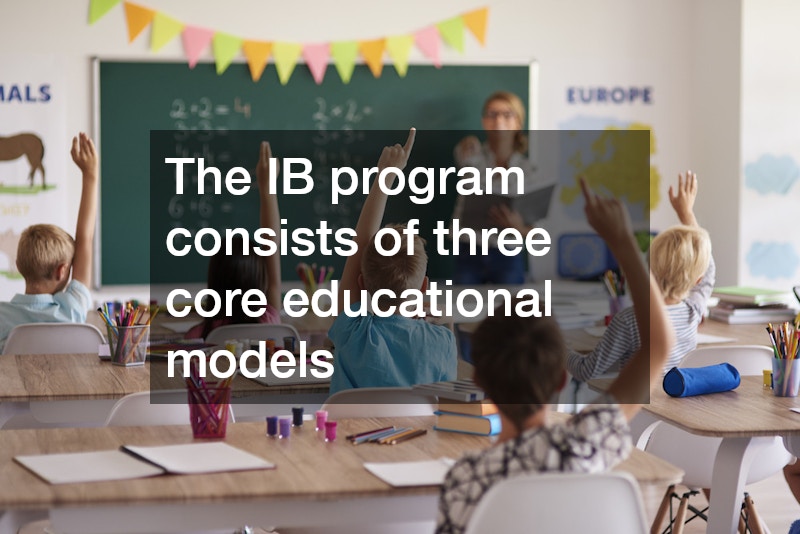The International Baccalaureate (IB) program is a globally recognized educational framework designed to develop intellectually curious, compassionate, and open-minded individuals. It offers a rigorous curriculum that encourages students to think critically, engage in collaborative problem-solving, and become active, empathetic global citizens. Established in 1968 by the International Baccalaureate Organization (IBO), the program has grown to serve students in more than 150 countries, with an increasing number of schools adopting its curricula.
The Structure of the IB Program
The IB program consists of three core educational models: the Primary Years Program (PYP), the Middle Years Program (MYP), and the Diploma Program (DP), with a recent addition known as the Career-related Program (CP). Each of these programs targets different age groups, from elementary school through to post-secondary education, and is designed to support the holistic development of students.
1. Primary Years Program (PYP)
The PYP is designed for children aged 3 to 12 years. It focuses on the development of the whole child, both academically and socially, and emphasizes inquiry-based learning. The program encourages students to become active learners who explore and investigate various topics across six transdisciplinary themes, including “Who We Are,” “How the World Works,” and “How We Organize Ourselves.” This program is built around the idea of fostering an intrinsic love for learning and developing critical thinking skills from a young age.
2. Middle Years Program (MYP)
The MYP caters to students aged 11 to 16 years. It provides a broad and balanced education across eight subject groups: language and literature, individuals and societies, sciences, mathematics, arts, physical and health education, design, and technology. The MYP helps students gain knowledge across these subjects while developing their intellectual, personal, emotional, and social skills. The program stresses the importance of connections between different subject areas and includes an emphasis on inquiry, creativity, and intercultural understanding.
3. Diploma Program (DP)
The Diploma Program is one of the most well-known components of the IB framework, designed for students aged 16 to 19 years. It is an academically challenging and comprehensive program that prepares students for university education or a career. The DP includes six subject groups: Studies in Language and Literature, Language Acquisition, Individuals and Societies, Sciences, Mathematics, and the Arts. Students must choose one subject from each group, although they are allowed to select an additional science or humanities subject instead of an arts subject.
In addition to their six subjects, students are required to complete three core components that are unique to the DP:
Theory of Knowledge (TOK): A course designed to encourage critical thinking and self-reflection on the nature of knowledge, challenging students to explore how they know what they know.
Extended Essay (EE): A 4,000-word research paper that allows students to investigate a topic of personal interest in depth, fostering independent research and academic writing skills.
Creativity, Activity, Service (CAS): A component designed to encourage students to participate in extracurricular activities that promote personal growth, such as volunteering, creative pursuits, and physical challenges.
These three core components of the DP are central to the program’s philosophy, as they emphasize the development of well-rounded individuals who are not only academically capable but also socially responsible and self-reflective.
4. Career-related Program (CP)
The CP, introduced in 2012, is a more vocationally oriented program designed for students aged 16 to 19 who are interested in pursuing career-related education while completing their secondary school studies. The CP combines the rigour of the IB DP with career-related courses and work experience. Students are encouraged to integrate academic and career-related skills through the completion of a professional development project and career-related studies that are tailored to their interests and aspirations. The CP is an ideal choice for students who wish to pursue specific career pathways, such as engineering, business, or healthcare, while still receiving a comprehensive education grounded in IB values.
Key Features of the IB Program
1. Global Perspective and International Mindedness
One of the defining aspects of the IB program is its emphasis on developing international-mindedness. The curriculum encourages students to view themselves as global citizens, respect cultural diversity, and appreciate differing viewpoints. Students learn to analyze global issues, appreciate cultural contexts, and work with peers from diverse backgrounds, which ultimately fosters a sense of global responsibility. The program’s international focus is reinforced by the IBO’s network of schools around the world, creating opportunities for students to engage in cross-cultural collaborations.
2. Rigorous and Holistic Education
The IB curriculum is renowned for its academic rigor, requiring students to engage in critical thinking, independent research, and analytical writing. However, the IB approach is not solely focused on academic achievement; it also places significant importance on personal development. The programs are designed to nurture intellectual curiosity, self-discipline, and emotional intelligence, creating well-rounded individuals capable of addressing the challenges of an ever-changing world.
3. Assessment Methods
Assessment in the IB program is varied, involving a combination of internal and external evaluations. These assessments are designed to measure both knowledge and skills, ensuring that students are able to demonstrate their understanding and application of concepts. In the DP, for example, assessments include written exams, coursework, oral presentations, and extended essays. The program’s assessment philosophy is centered around the idea of measuring students’ abilities to apply their knowledge in real-world situations, rather than relying solely on rote memorization.
Benefits of the IB Program
The benefits of the International Baccalaureate program are numerous and can have a profound impact on a student’s academic journey and beyond. Firstly, IB students often demonstrate higher levels of academic achievement due to the program’s rigorous structure and emphasis on critical thinking and independent learning. Additionally, universities and colleges around the world recognize and highly value the IB diploma, as it signifies a high level of preparedness for higher education.
Furthermore, the IB program’s emphasis on international-mindedness and intercultural understanding provides students with valuable life skills that are crucial in today’s globalized world. The program’s focus on holistic education helps students to develop strong problem-solving abilities, excellent time management skills, and a passion for lifelong learning.
In conclusion, the International Baccalaureate program provides a comprehensive, globally recognized educational framework that fosters academic excellence, personal growth, and global citizenship. By offering a balanced approach to education, the IB program challenges students to think critically, act responsibly, and embrace diverse perspectives, preparing them to succeed in an increasingly interconnected world.

